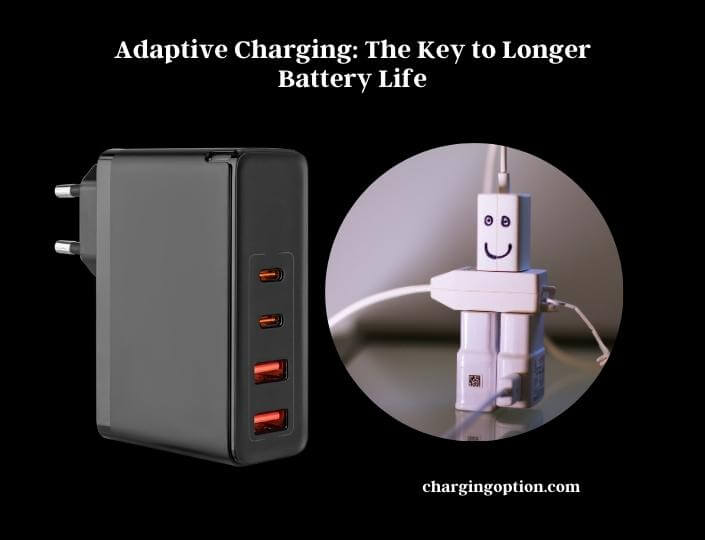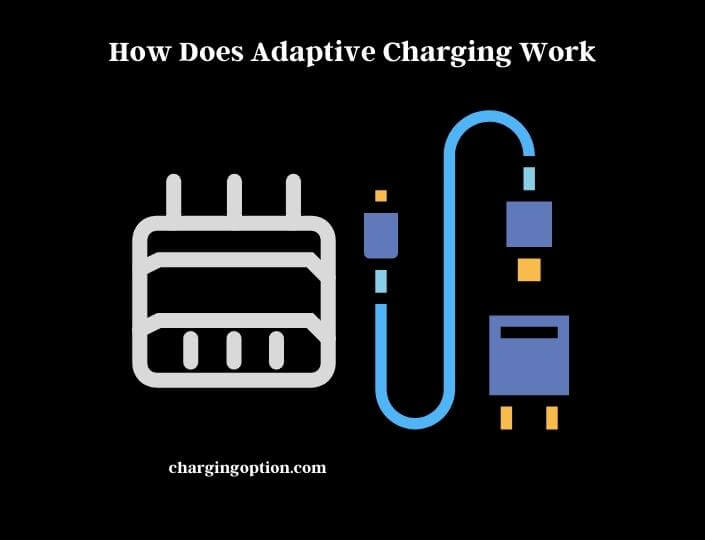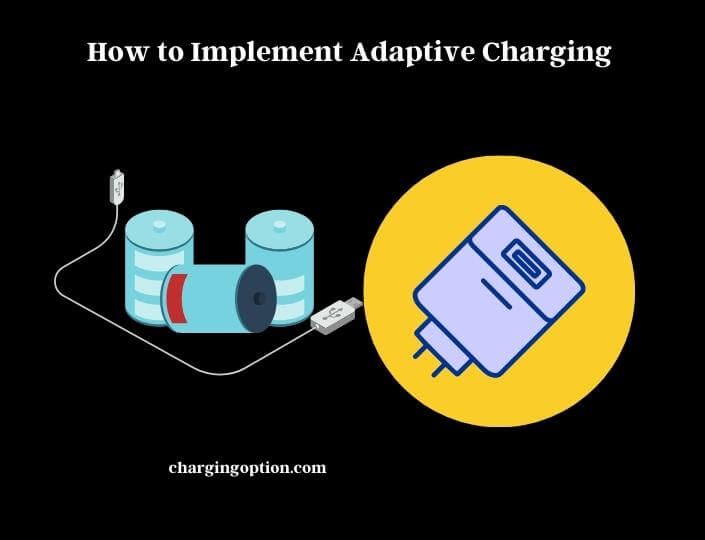As the world transitions towards clean energy sources, electric vehicles (EVs) are becoming increasingly popular. While this is a positive development, it has brought to light the challenges of managing the charging of large numbers of batteries, which can be a significant strain on the power grid. Battery health is a key concern for both EV and stationary energy storage applications. To address these challenges, a new approach to charging is needed that can adjust to changing energy demands and usage patterns. This is where Adaptive Charging comes in.

Adaptive Charging is a dynamic charging method that optimizes the charging process based on a range of factors, such as time of day, energy prices, and grid stability. By using data and algorithms, adaptive charging can ensure that batteries are charged efficiently, effectively, and safely.
Adaptive Charging
Adaptive Charging is a smart charging method that uses real-time data and algorithms to adjust the charging of batteries based on various factors. These factors can include energy prices, time of day, and grid stability, among others. The goal of Adaptive Charging is to optimize the charging process for efficiency, effectiveness, and safety, while also reducing the impact on the power grid.
Adaptive Charging is an evolution of traditional charging methods, which typically involve plugging a device into an outlet and charging it at a constant rate until the battery is full. Adaptive Charging, on the other hand, takes a more dynamic approach, adjusting the charging rate based on the current conditions. For example, if energy prices are high during peak hours, Adaptive Charging may delay the charging process until off-peak hours when prices are lower. Similarly, if the grid is experiencing high demand, Adaptive Charging may reduce the charging rate to avoid putting additional strain on the grid.
How Does Adaptive Charging Work
Adaptive charging is a charging method for electric vehicles (EVs) that adjusts the charging rate and timing based on various factors such as battery temperature, capacity, and grid demand. This allows for a more efficient and optimized charging experience for both the EV owner and the electric grid.

To achieve this, adaptive charging systems use advanced algorithms and communication protocols to gather information from the EV, the charging station, and the grid. The system then analyzes this data and adjusts the charging rate and timing accordingly.
For example, if the battery is already partially charged, the system may slow down the charging rate to avoid overcharging and extend the life of the battery. If the battery is cold, the system may warm it up before starting the charging process to improve the efficiency of the charging process.
Adaptive charging systems can also communicate with the grid to adjust the charging rate based on the current demand for electricity. During times of peak demand, the system may slow down the charging rate to reduce strain on the grid. Conversely, during times of low demand, the system may increase the charging rate to take advantage of excess capacity.
Some adaptive charging systems also have the ability to learn from previous charging sessions and adjust the charging strategy based on the individual characteristics of the EV and its battery.
How to Implement Adaptive Charging
Adaptive charging refers to the process of adjusting the charging rate of a battery to optimize its health and longevity. It involves monitoring the battery’s state of charge and adjusting the charging current or voltage to ensure that the battery is charged in a safe and efficient manner. Here are some steps you can take to implement adaptive charging:

Choose a Charging Algorithm
There are different types of charging algorithms, including constant current, constant voltage, and pulse charging. Each algorithm has its benefits and drawbacks. You should choose the algorithm that is best suited for the type of battery you are using.
Use a Charging Controller
A charging controller is a device that regulates the charging current and voltage to ensure that the battery is charged safely and efficiently. It monitors the battery’s state of charge and adjusts the charging rate accordingly.
Monitor the Battery’s State of Charge
To implement adaptive charging, you need to monitor the battery’s state of charge. This can be done using a battery management system (BMS) or a microcontroller. The BMS or microcontroller will measure the battery’s voltage and current and use this information to determine the state of charge.
Adjust the Charging Rate
Once you have determined the battery’s state of charge, you can adjust the charging rate to optimize the charging process. For example, if the battery is almost fully charged, you can reduce the charging current or voltage to prevent overcharging.
Implement Safety Measures
Adaptive charging can help to extend the life of your battery, but it is important to implement safety measures to prevent damage to the battery or other components. For example, you should use a charging controller that has built-in safety features such as overcurrent protection and short-circuit protection.
Test and Optimize
It is important to test and optimize your adaptive charging system to ensure that it is working correctly. You should monitor the battery’s health over time and adjust the charging algorithm if necessary to optimize its longevity.
Benefits of Adaptive Charging
Adaptive charging is an innovative technology that offers a number of benefits for electric vehicle (EV) owners, utilities, and the electric grid. Here are some of the key advantages of adaptive charging:
Efficient Charging: Adaptive charging optimizes the charging process for each EV, taking into account factors such as battery temperature, capacity, and charging history. This results in more efficient charging that can extend the life of the battery and reduce energy waste.
Reduced Strain on the Grid: By adjusting the charging rate based on the current demand for electricity, adaptive charging can help to reduce strain on the grid during peak demand times. This can help to prevent blackouts and other disruptions in the power supply.
Cost Savings: Adaptive charging can also help to reduce the cost of charging an EV. By charging during off-peak hours when electricity rates are lower, EV owners can save money on their energy bills.
Increased Flexibility: Adaptive charging provides EV owners with greater flexibility in when and how they charge their vehicles. With adaptive charging, EV owners can set their preferred charging time and rate, and the system will adjust accordingly based on factors such as grid demand and battery conditions.
Sustainability: By reducing the strain on the grid and optimizing charging, adaptive charging can help to promote a more sustainable energy system. This is especially important as the use of EVs becomes more prevalent and the demand for electricity continues to grow.
Improved Grid Reliability: Adaptive charging can also help to improve the reliability of the electric grid. By reducing peak demand and optimizing charging, adaptive charging can help to prevent power outages and other disruptions in the power supply.
Challenges and Considerations
While adaptive charging has many benefits, there are also some challenges and considerations that need to be taken into account when implementing this technology. Here are some of the key challenges and considerations:
Standardization and Interoperability
To ensure that adaptive charging systems can be used by all EVs and charging stations, it is important to establish standards for communication protocols and data formats. This will help to ensure that different systems can communicate with each other and share information in a standardized way.
Privacy Concerns
Adaptive charging systems gather a lot of data about the EV owner’s charging habits, and there are concerns about how this data will be used and who will have access to it. To address these concerns, it is important to establish clear guidelines for data privacy and security.
Compatibility with Existing Infrastructure
Adaptive charging systems may require upgrades to existing charging stations and grid infrastructure, which can be costly and time-consuming. It is important to ensure that the benefits of adaptive charging outweigh the costs of upgrading infrastructure.
Education and Awareness
Adaptive charging is a relatively new technology, and many EV owners may not be familiar with it. It is important to provide education and awareness campaigns to help people understand the benefits of adaptive charging and how to use it effectively.
User Adoption
For adaptive charging to be effective, it is important that EV owners use it regularly. However, some may be resistant to change or may not understand how to use the system effectively. To address this, it is important to provide user-friendly interfaces and clear instructions for using the system.
Regulation
Adaptive charging may require new regulations to be put in place to ensure that it is implemented effectively and safely. This may include regulations around data privacy and security, infrastructure upgrades, and interoperability standards.
Can Adaptive Charging Technology Be Used in AC Units for Longer Battery Life?
Yes, adaptive charging technology can be used in AC units for longer battery life. This advanced technology optimizes the charging process, prolongs battery lifespan, and reduces heat generation. For a comprehensive ac unit charging guide, consult with a professional technician to ensure the best performance and longevity of your unit.
Could Adaptive Charging Help Prolong the Battery Life of My Massage Gun?
Adaptive charging could be the key to fixing a massage gun charger and prolonging the battery life. By optimizing the charging process based on the battery’s unique needs, adaptive charging can help prevent overcharging and overheating, ultimately extending the lifespan of your massage gun’s battery.
Does Adaptive Charging Help with the Charging System Service?
Adaptive charging can indeed help with the signs of system service needed, as it optimizes charging based on the battery’s condition. This can prevent overcharging and extend the lifespan of the battery, ultimately reducing the frequency of needing charging system service.
Does Adaptive Charging Help Prolong Battery Life?
Insights on battery compartment charging: Adaptive charging has been deemed helpful in prolonging battery life. By analyzing usage patterns and adjusting charging levels accordingly, this technology prevents overcharging and reduces stress on the battery, ultimately extending its lifespan. With adaptive charging, devices can intelligently adapt to individual needs, optimizing battery performance and ensuring durability.
Conclusion
Adaptive charging is a promising technology that has the potential to significantly improve the charging experience for electric vehicle (EV) owners, while also reducing strain on the electric grid and promoting a more sustainable energy system. By optimizing the charging process based on factors such as battery temperature, capacity, and grid demand, adaptive charging can help to extend the life of the battery, reduce energy waste, and save EV owners money on their energy bills.
There are also several challenges and considerations that need to be taken into account when implementing adaptive charging. These include the need for standardization and interoperability, data privacy and security concerns, infrastructure compatibility, user adoption, and regulation.
Despite these challenges, the benefits of adaptive charging make it an important technology for the future of electric vehicles and the energy system as a whole. As EVs become more prevalent, adaptive charging will play an increasingly important role in ensuring a sustainable and reliable energy system.
It is important to continue to invest in the development and implementation of adaptive charging, while also addressing the challenges and considerations that come with this technology. By doing so, we can help to promote a more sustainable, efficient, and reliable energy system for future generations.
